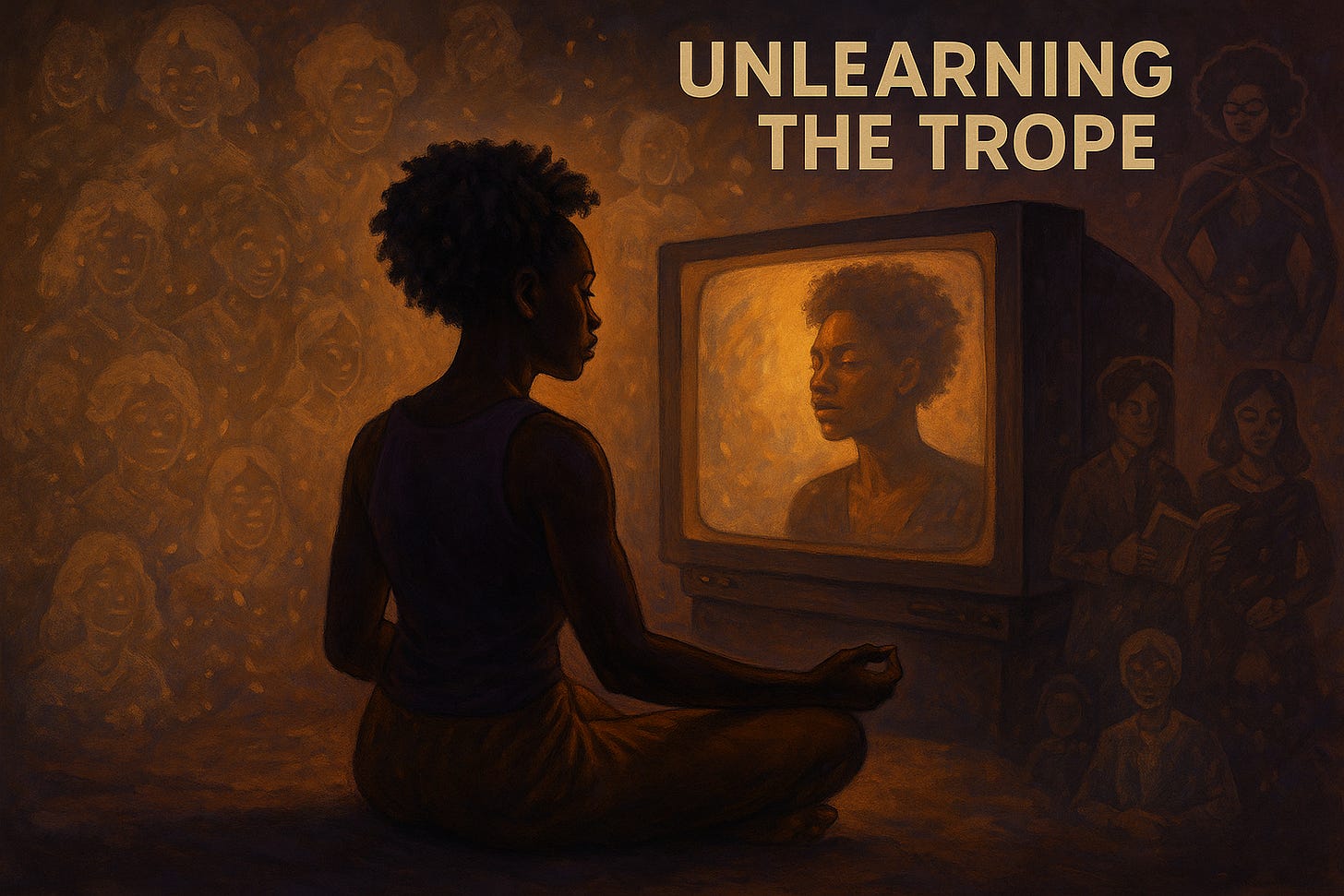Unlearning the Trope: A Black Woman's Journey Through Media and Misogynoir
Defining a common trope can transform Black femme representation
One of the hardest truths I’ve had to sit with in my journey as a Black woman is misogynoir: both the internalized beliefs and the external portrayals that shaped not just how others saw me, but how I came to see myself. It didn’t always feel violent. Sometimes it felt like invisibility. Sometimes like overexposure. But it always, always left an imprint.
Misogynoir is the specific anti-Black racist misogyny that Black women experience, especially in the U.S. and particularly in the ways we’re depicted - or not depicted - across media (Bailey, 2021). The term, coined by Dr. Moya Bailey, gave language to something I had long felt but didn’t always have the words for. And that naming became the beginning of a much deeper journey.
Because the truth is, even when I didn’t know what misogynoir was, I was already responding to it. I was already negotiating it. I was already learning to shrink, reshape, or overperform based on who I was expected to be.

Internally, the hatred modeled to me through media made it unsafe to be proud of my milk chocolate complexion. My kinky, coily hair was labeled "unruly." My booming voice—too loud. The curves of my body—too much. I began to wonder if I was too much, or not enough, depending on the space I was in.
Externally, when I turned to the screen to try and find myself, I saw bits and pieces. But those pieces were usually fragmented and filtered through a narrow lens. Dark-skinned Black women existed, but we were often side characters—the comic relief, the magical helper, the best friend to the white or lighter-skinned lead. And when we were centered, we were mystical, wise, flawless, or broken. Never fully human. Never allowed contradictions. Never allowed softness unless it served someone else.
Dr. Ebony Elizabeth Thomas (2019) names this archetype as the Dark Other: a being designed to walk alongside white main characters and assist them on their hero’s journey. We are made monstrous, magical, or tragic, but never centered for our own sake. In many ways, even the roles I cherished still carried this burden. I loved Whoopi Goldberg in Sister Act and Sister Act II. She was riotous, brilliant, deeply herself. But even there, I understood that her power was often framed in relation to how it helped others grow.
Thomas (2019) offers an alternative framework: The Dark Fantastic.
A reimagining of Black girls in fantasy, not as assistants in someone else's mythos but as full beings. With inner lives. With their own stakes. With choices not dictated by how they help or heal others, but simply by what they want and need. It is through this lens that I began the slow process of unlearning the tropes.
That unlearning doesn’t just happen through theory. It happens through immersion in stories that push back. In characters that defy. In women who choose themselves and their communities not as symbols, but as subjects.
That’s why I keep reading and watching. Not for escapism alone, but for reclamation. To fill the gaps where my identity was flattened. To heal the little girl who only saw herself as someone else's plot twist.
If you're on this journey too, if you're beginning to unlearn the tropes that shaped your sense of worth, here are some texts and series that have helped me reclaim and rebuild:
Read:
Bailey, M. (2021). Misogynoir transformed: Black women’s digital resistance. NYU Press.
To truly understand the term and it’s influences on the Black femme identity. A MUST READ!
Thomas, E. E. (2019). The dark fantastic: Race and the imagination from Harry Potter to the Hunger Games. NYU Press.
This book presents a theoretical understanding of how media representation affects the Black female body in fantasy.
ebonyjanice. (2023). All the Black girls are activists: A fourth wave womanist pursuit of dreams as radical resistance. Broadleaf Books.
Redefining feminism and womanism through the lens of the Black female voice and body.
Watch:
Ironheart (Disney+, 2025) – Created by Chinaka Hodge
This series doesn’t just feature a Black girl genius, it centers her grief, brilliance, rage, and power as a full human arc. Riri Williams is not a trope; she’s a reckoning.
Scandal (Netflix, 2012) – Shonda Rhimes
This gave us Olivia Pope, a Black woman who was messy, brilliant, powerful, and complicated; a lead character who didn’t exist just to heal or help someone else.
The Changeling (Apple+, 2023) – Directed by Melina Matsoukas
This surreal horror-fantasy uses parenthood, mythology, and Black interiority to tell a haunting and poetic story that resists easy categorization.
These stories don’t fix the long legacy of misogynoir. But they offer a different map. One that doesn’t require our pain to justify our presence. One that doesn’t ask us to perform palatability to be seen. One where we are already worthy, already real, already whole.
Because we have always been all that. We were just waiting for the lens to adjust.




